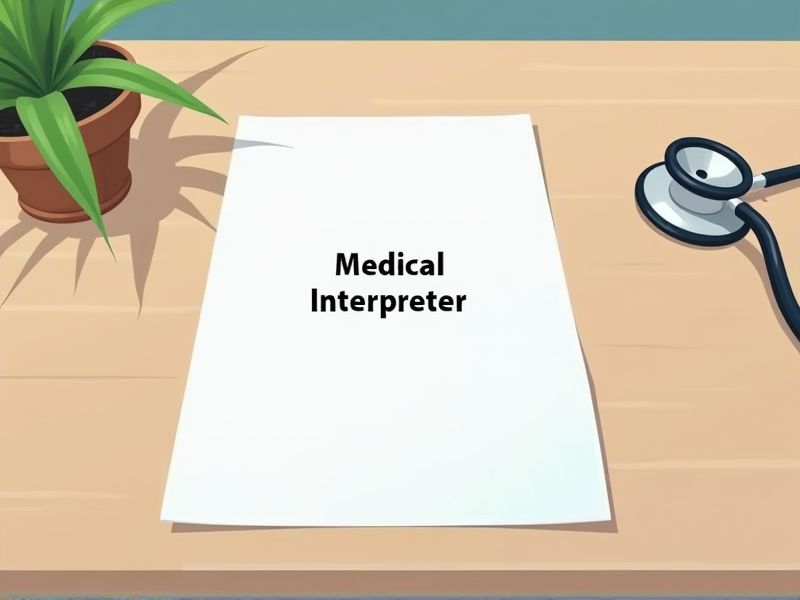
Medical interpreters bridge the language gap between healthcare providers and patients, ensuring clear and accurate communication. Accurate interpretation mitigates misunderstandings and reduces the risk of errors in medical treatment, necessitating a high standard of proficiency. Certifications play a crucial role by validating an interpreter's linguistic skills and understanding of medical terminology. Essential certifications bolster a medical interpreter's credibility and are often mandatory for professional practice.
Certification Commission for Healthcare Interpreters (CCHI) Certified Healthcare Interpreter (CHI)
The CCHI Certified Healthcare Interpreter (CHI) credential enhances trust between healthcare providers and patients by ensuring interpreters have a comprehensive understanding of medical terminology and procedures. A CHI certification signals to employers and clients that the interpreter meets rigorous national standards for linguistic competence and effective communication. This certification reduces the risk of miscommunication, which can lead to medical errors and compromised patient outcomes. With diverse patient populations, the CHI credential addresses the need for culturally competent language services in healthcare settings.
National Board of Certification for Medical Interpreters (NBCMI) Certification
NBCMI Certification establishes a standardized benchmark for evaluating the proficiency and skills of medical interpreters. This ensures interpreters possess the necessary medical terminology knowledge and cultural competence to facilitate accurate communication between healthcare providers and patients. The certification process enhances professional credibility and can lead to better employment opportunities in medical settings. By adhering to a recognized standard, patient safety and care quality are significantly improved due to reduced risk of miscommunication.
American Translators Association (ATA) Certification
The American Translators Association (ATA) Certification provides a recognized standard of proficiency, ensuring accuracy and professionalism in medical interpretation. Without certification, medical interpreters might lack the necessary skills to navigate complex medical terminology, potentially leading to misunderstandings with serious health repercussions. Hospitals and healthcare providers often require ATA-certified interpreters to comply with regulatory standards and reduce liability risks. Certification strengthens an interpreter's credibility, fostering trust with both healthcare professionals and patients.
Diploma in Medical Spanish Interpretation
A Diploma in Medical Spanish Interpretation ensures interpreters have specialized language skills crucial for accurate communication in healthcare settings. With a growing Spanish-speaking population, the demand for qualified interpreters prevents language barriers from affecting patient care. Proper certification validates an interpreter's competence in medical terminology, reducing the risk of misinterpretation. This specialized training can lead to improved patient satisfaction and outcomes by facilitating clearer communication between healthcare providers and patients.
Certificate in Health Care Interpreting
A Certificate in Health Care Interpreting ensures that medical interpreters are familiar with both medical terminology and procedures, reducing the risk of miscommunication. Proper certification equips interpreters with knowledge of legal and ethical standards, crucial for safeguarding patient confidentiality and rights. Trained interpreters can better facilitate accurate patient-provider communication, leading to improved healthcare outcomes. Certification provides a level of professionalism and trustworthiness necessary for navigating complex medical environments.
Medical Terminology Certification
A Medical Terminology Certification equips interpreters with precise language skills, reducing the likelihood of miscommunication in clinical settings. Mastery of medical terminology enhances an interpreter's ability to accurately convey complex medical information between practitioners and patients. Certified knowledge ensures better patient outcomes, as misunderstandings can lead to inappropriate treatments or missed diagnoses. Healthcare facilities are more likely to employ interpreters with certifications, valuing their verified expertise and reliability in sensitive environments.
Certified Bilingual Medical Professional (CBMP) Certification
Healthcare providers increasingly serve diverse patient populations. Language barriers can compromise patient care and lead to medical errors. The Certified Bilingual Medical Professional (CBMP) Certification verifies the proficiency of medical interpreters in both languages and medical terminology. This certification ensures accurate communication, thereby improving patient outcomes and trust in healthcare systems.
Certificate in Medical Translation and Interpretation
A Certificate in Medical Translation and Interpretation enhances a medical interpreter's credibility by ensuring they have formal training in translating complex medical terminology accurately. This certification facilitates better patient outcomes as it ensures clear communication between healthcare providers and non-English speaking patients. It reduces the risk of misinterpretation that could lead to medical errors or misunderstandings in treatment plans. Regulatory agencies and healthcare institutions often require or prefer certified professionals to comply with industry standards and legal requirements.
Certified Medical Spanish Interpreter Credential
The Certified Medical Spanish Interpreter Credential ensures that interpreters possess a standardized proficiency in medical terminology, which helps prevent miscommunication in critical healthcare settings. Certification provides patients with limited English proficiency the confidence that they will receive accurate and culturally sensitive information regarding their medical care. It increases the trust between healthcare providers and patients, leading to better patient outcomes and adherence to medical advice. Additionally, it reduces the risk of legal liabilities for healthcare institutions, as accurate interpretation is crucial for informed consent and compliance with healthcare regulations.
Cross-Cultural Communication in Healthcare Certification
Cross-cultural communication in healthcare certification equips medical interpreters with skills to accurately translate medical terminology across different languages, reducing the risk of miscommunication in clinical settings. Certified interpreters enhance patient trust and comprehension, leading to better adherence to treatment plans and improved health outcomes. This certification also ensures interpreters understand cultural nuances and sensitivities, which impacts patient-provider relationships positively. Hospitals benefit from employing certified interpreters by maintaining compliance with legal standards and improving overall patient satisfaction.
Summary
By obtaining certifications, you can significantly enhance your credibility as a medical interpreter, leading to greater trust from patients and healthcare professionals. Certification often results in increased job opportunities and potentially higher salaries due to validated skills. Your ability to accurately and effectively bridge language gaps improves, leading to better patient outcomes and satisfaction. Continuous professional development through certifications also keeps your skills aligned with industry standards and advancements.
